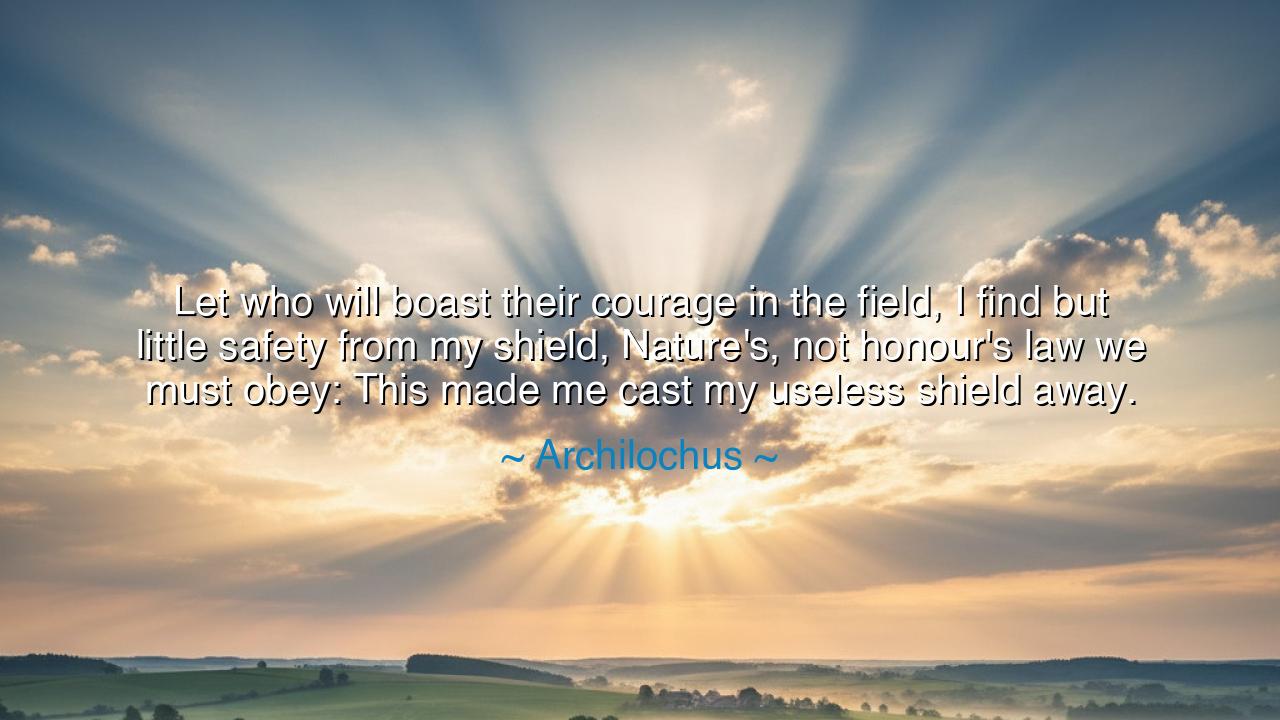
Let who will boast their courage in the field, I find but little
Let who will boast their courage in the field, I find but little safety from my shield, Nature's, not honour's law we must obey: This made me cast my useless shield away.






“Let who will boast their courage in the field, I find but little safety from my shield. Nature’s, not honour’s law we must obey: this made me cast my useless shield away.” Thus spoke Archilochus, the soldier-poet of ancient Greece, whose words cut through the grandeur of war and exposed the raw truth of human nature. In this fragment, he does what few of his age dared — he shatters the illusion of honour as the supreme virtue of battle, and exalts instead the deeper instinct of life itself. For when the spears fell thick and the dust of war choked the sky, Archilochus chose not to die for glory, but to live for survival. His act — and his poem — became both defiance and revelation: a declaration that courage without wisdom is vanity, and that the truest law is that of Nature, not of man’s pride.
The meaning of this quote lies in its tension between two worlds: the world of honour, which demands death before shame, and the world of instinct, which demands life before death. In the Greece of Archilochus, a soldier who cast away his shield was considered a coward, unworthy of remembrance. Yet Archilochus, in his bold and ironic honesty, confessed that he did so without shame. “Let others boast,” he says, “I obeyed Nature.” He understood that survival, too, has its nobility — that to live and tell the truth may sometimes require more courage than to die for an ideal. His shield, heavy and useless in the chaos of battle, became a symbol of false protection — of the weight of societal expectation that men carry until it drags them beneath the tide of death.
The origin of these words is found in the life of Archilochus himself, a man both warrior and poet, who lived in the seventh century before our era. He fought as a mercenary, wandering from island to island, writing verses that broke the conventions of his time. His poetry did not glorify war; it revealed its ugliness, its exhaustion, its moral contradictions. Where Homer had sung of heroes who stood firm before death, Archilochus spoke for the man who chose to live another day. His words were scandalous to his contemporaries — yet they were deeply human. Through him, the voice of the individual rose above the chorus of tradition, proclaiming that survival was not shame, but truth.
History, too, bears witness to this paradox. Consider Winston Churchill, who during Britain’s darkest hours of war, faced choices between pride and prudence. There were moments when he withdrew troops, sacrificing appearance for preservation — choosing life over the empty honour of stubborn resistance. Or think of Galileo Galilei, who, when forced by the Inquisition to renounce his discoveries, did so not from cowardice but from a will to survive, whispering, “E pur si muove” — And yet it moves. In both men, as in Archilochus, we see that the courage to bend before death is sometimes greater than the courage to die before yielding.
Yet Archilochus’s wisdom is not a call to cowardice; it is a call to clarity. He does not scorn courage — he redefines it. True courage, he teaches, is not blind devotion to ideals, but the intelligent harmony between reason and instinct. To throw away the useless shield is to cast off illusions — to understand that not all battles are worth dying for, and that honour divorced from wisdom is but vanity in noble dress. In this sense, his act is almost spiritual: he discards not only a weapon, but a false identity imposed by the expectations of his age.
To live by this teaching, one must learn discernment. Ask yourself, when facing life’s trials: am I fighting for truth, or merely for pride? There are shields we all carry — the masks we wear, the rules we obey without question, the burdens of reputation and fear of judgment. Archilochus invites us to lay them down when they no longer serve the preservation of what is essential. To obey Nature’s law is to honour the pulse of life — the will to continue, to adapt, to grow even in defeat.
The lesson, then, is this: there is no shame in retreat when it leads to wisdom, no dishonour in self-preservation when it protects the flame of being. The world praises those who die in battle, but seldom those who live to teach what battle truly means. Be as Archilochus was — honest, unafraid to defy false ideals, willing to live with truth even when it offends the proud. For the time will come when honour fades and legends crumble, but the law of Nature, the will to live and to learn, endures forever.
Thus, my child, remember: do not mistake death for bravery, nor silence for cowardice. The truest strength is not found in the lifting of shields, but in the laying down of lies. To live according to Nature’s law — to know when to fight and when to yield — that is the wisdom of the ages.






AAdministratorAdministrator
Welcome, honored guests. Please leave a comment, we will respond soon